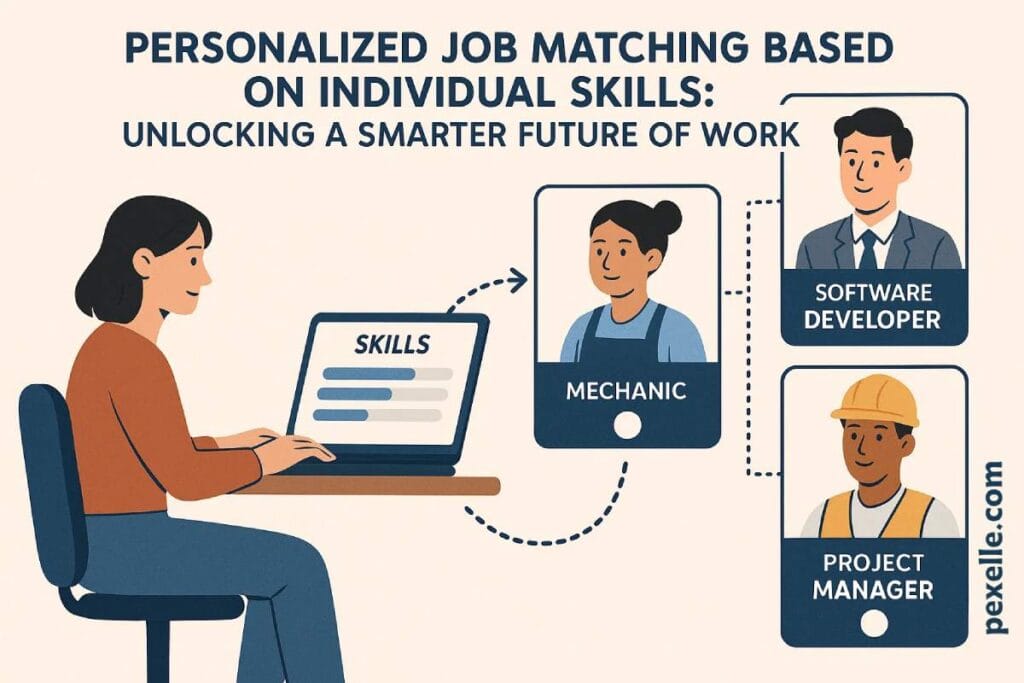Personalized Job Matching Based on Individual Skills: Unlocking a Smarter Future of Work

In today’s fast-evolving job market, traditional hiring models that rely solely on degrees, job titles, or rigid qualifications are increasingly inadequate. As automation, digitization, and remote work reshape the global workforce, a skills-first approach to employment is gaining traction. One particularly transformative idea is designing job opportunities based on individual skill profiles — rather than forcing individuals to fit predefined roles. This paradigm shift can unlock numerous advantages for employers, job seekers, and the broader economy.
1. Closing the Skills Gap More Effectively
One of the biggest challenges for governments and companies alike is the growing skills gap. Employers struggle to find candidates with the right capabilities, while workers are often underemployed or in roles that do not match their true potential. By aligning jobs with individual skills — whether technical (e.g., Python, data analysis) or soft (e.g., problem-solving, collaboration) — we ensure that people are matched with roles they are truly qualified for. This enhances productivity from day one and reduces costly onboarding or retraining.
2. Empowering Individuals and Promoting Career Agility
When job listings adapt dynamically to what people can do rather than what they’ve done before, individuals gain more agency in shaping their careers. This is especially critical in a world where career paths are non-linear. A person with skills in content writing, UX design, and AI prompting might not fit a single job description but could be perfect for a hybrid role — or even inspire the creation of a new one. Personalized job matching encourages reskilling, supports lifelong learning, and allows for smooth career transitions in an ever-changing landscape.
3. Increasing Workforce Inclusion and Equity
A skills-based job market levels the playing field. Instead of filtering candidates based on pedigree, school reputation, or years of experience, employers can tap into a much more diverse talent pool. People from non-traditional backgrounds, self-taught individuals, and those from underrepresented communities get fairer chances to be evaluated based on what they know and can do. This leads to more inclusive hiring practices and helps build equitable, merit-driven organizations.
4. Enabling More Responsive and Adaptive Labor Markets
When job ads are dynamically generated based on the available skills in the labor force, the job market becomes a two-way ecosystem. Employers no longer post static roles; instead, they discover available talent and craft roles accordingly. This responsiveness is especially useful in sectors facing rapid innovation, such as green energy, cybersecurity, or blockchain, where emerging skills often outpace existing job taxonomies. Governments and platforms can even forecast talent surpluses or shortages and respond with targeted training or subsidies.
5. Driving Innovation and Economic Resilience
Organizations that hire based on skill sets rather than titles foster cross-functional teams with broader creative range. For example, combining someone skilled in design thinking, statistics, and public policy can lead to breakthrough solutions in civic tech. Skill-centric job design encourages experimentation and flexibility, which are vital traits in a volatile global economy. Moreover, this reduces unemployment friction and allows economies to better absorb technological disruptions.
6. Enhancing HR Tech and Talent Intelligence
The movement toward personalized job matching also accelerates the development of smarter talent platforms. AI-driven job boards, skills graphs, and dynamic career pathing tools can generate custom job recommendations, identify transferable skills, and suggest upskilling options. Companies gain access to real-time talent intelligence, and individuals receive guidance tailored to their strengths and goals. Over time, this fosters a more data-driven and adaptive labor market ecosystem.
Conclusion: From Static Jobs to Dynamic Opportunities
A future in which jobs are built around people — rather than people being squeezed into rigid roles — represents a profound shift in the world of work. By embracing personalized, skills-based job matching, we open the door to a fairer, more productive, and more innovative economy. This isn’t just a better way to hire — it’s a smarter way to build the future.
Source : Medium.com




